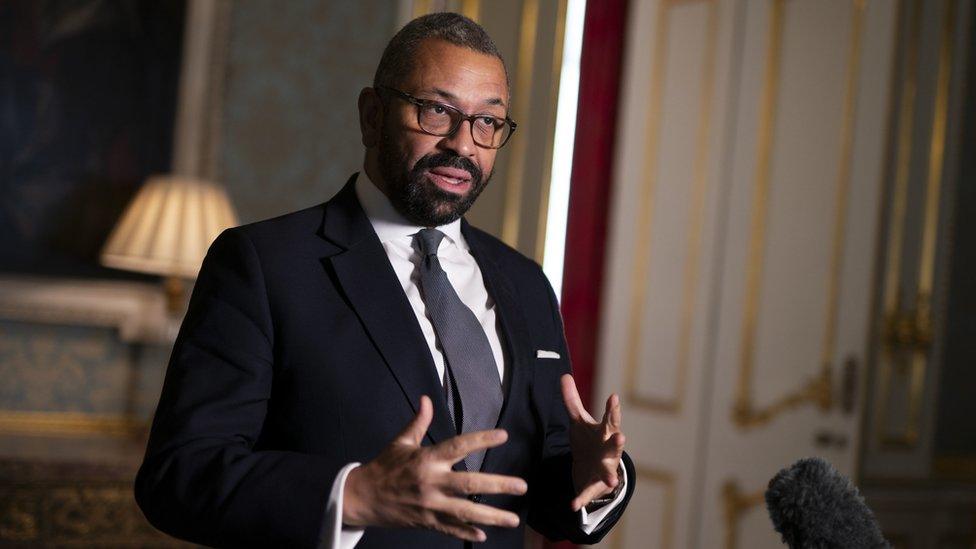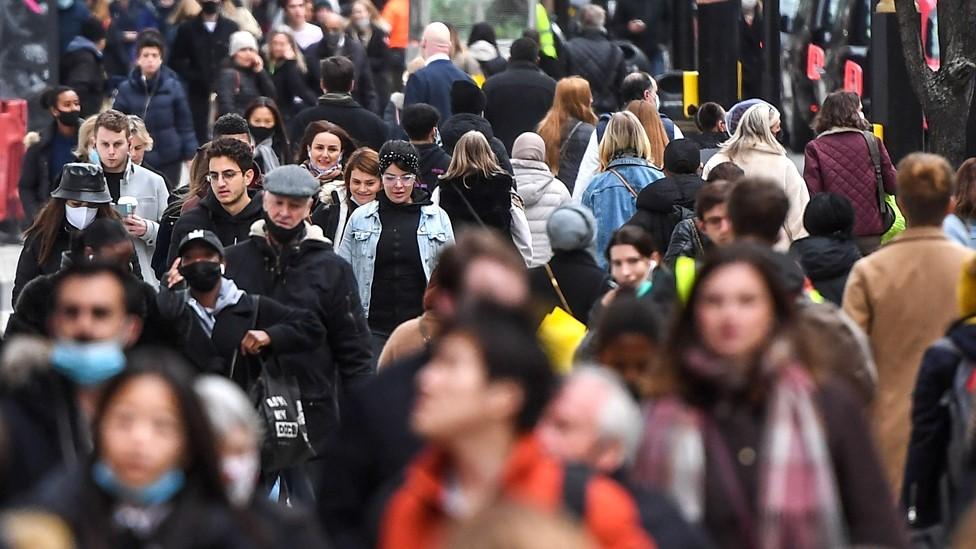New migrant rules may cause staff shortages, employers warn
- Published

Migrants work in various industries across Northern Ireland
Employers in Northern Ireland are warning that new migration rules may cause staff shortages across manufacturing, care and food production.
The new measures state the minimum salary needed for skilled overseas workers will be £38,700 - up from the current threshold of £26,200.
This is well above the average NI salary of £30,000.
Salaries in Northern Ireland are lower than in many other parts of the UK.
The UK government introduced the measures in a bid to make the "biggest ever" cut in net migration.
The rules will not apply to some jobs - such as in health and social care.
But in this sector, overseas care workers will not be able to bring in family dependants.
And some labour professionals say the salary threshold is too high.
'It's fairly catastrophic'
The managing director of Edge Innovate in Dungannon, Darragh Cullen, said the change will limit companies' growth.
He employs about 50 migrant workers out of 200 and this change will cause huge damage.
"It's effectively closing the door in bringing new people in from outside the UK," he said.
"The impact it's going to have on our business and also other manufacturing companies in this region - it's hard to fathom at the minute, it's fairly catastrophic - it means that companies are going to be limited in their ability to grow," he added.
Robert Jenrick, the UK immigration minister, said gaps in the labour market caused by new immigration plans will "be filled by British workers".
Mr Cullen said that will not be possible in Northern Ireland,
"That might be fine in England and Wales - but it's certainly not in Northern Ireland because there is no available labour here to fill the positions that we need filled.
"Our only other option has been to bring people in from outside," he added.
"The British government has come out with a sweeping statement that covers the whole of the UK but they haven't looked specifically at what's going on in the different regions - especially Northern Ireland."
'It's hard enough as it is'
Arek Rajzer is the manager of Deanes at Queens restaurant and he came to Northern Ireland 15 years ago,
"I came here for a holiday and fell in love with the country and I started doing the dishes - worked all the way up to manage one of the established restaurants in Northern Ireland and I am proud of it."
"The new rules - they (migrant workers) will not be able to stay over here - to make a new home here - they are not going to be able to do it - people are going to choose a different country."
"If you can't bring your family here, there's no way you can settle in this country - family is a big thing - for many many migrant people."
"It's hard enough already for us coming here without the language, without the family - it is already hard. If you're not having that sort of support level from the government over here - there's no way the economy is going to grow."
Since Brexit Mr Rajzer said it has been difficult to find anyone looking to work in the hospitality sector,
"Before Brexit we used to have maybe 20 or 30 workers after Brexit we have maybe one or two a week only - people from the EU - we don't have that many local people that want to work in this type of business."

On top of the new salary requirements, the government said it would:
Ban care workers bringing family dependants to the UK
End companies being able to pay workers 20% less than the going rate for jobs on a shortage occupation list
Increase the annual charge foreign workers pay to use the NHS from £624 to £1,035
Raise the minimum income for family visas to £38,700, from £18,600 from next spring
Ask the government's migration adviser to review the graduate visa route to "prevent abuse"

One Belfast man has told BBC Radio Five Live he is earning too little to marry his Malaysian girlfriend, who he met at university, and stay in Northern Ireland.
Lee, 24, who earns £26,000 said: "I just hate this, all this planning we've had and it's just now all crashing down. Now basically if I want to be with someone I love I can't be in this country anymore."
'I would go somewhere else'
Dr Omar Benkhirin moved to Ireland from Libya 20 years ago and works at the Royal Victoria Hospital. He said choosing to move is not easy,
"Living as an immigrant is not an easy experience, to be away from home - you're missing a lot, he told BBC Radio Ulster's Evening Extra programme.
"If you add to it you can't bring your family - that will make the equations more and more difficult."
"If I had to do it, I would do it for a few years - and that is just for training, get certificate and go somewhere where I could build up my family."
'My home would be closed'
Roberta Brownlee owns a care home in Castlederg, she said without migrant workers her care home will close.
"In the past ten years it's been extremely difficult to recruit staff.
"My nursing home would be closed today if I wasn't able to have my international staff."
Ms Brownlee added that rules around banning care workers bringing family dependants to the UK is an issue,
"It would be extremely difficult - to manage health and social care in Northern Ireland because many of these staff - rightly so - want to bring their dependants with them and their family.
"We all want to live with our families."
- Published5 December 2023

- Published5 December 2023

- Published23 November 2023

